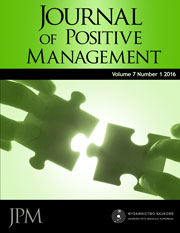USING THE IDEA OF THE BOSTON CONSULTING GROUP MATRIX IN MANAGING A UNIVERSITY
DOI:
https://doi.org/10.12775/JPM.2016.005Keywords
BCG matrix, management at a universityAbstract
The literature on the subject has includes numerous methods and tools which may be helpful in managing a university. Some of them are related to the aspect of balance [1]. This article presents a suggestion to use the idea of the BCG matrix in managing a university. Currently, the BCG matrix is widely used in shaping the production portfolio or the service portfolio. It indicates profitable products and services the surplus of which should be allocated for the development of unprofitable ones which may bring profit in the future. According to the author of the article, the idea of the BCG matrix could be transferred to the level of universities and used to assess faculties indicating the faculties which, due to high profitability, should be maintained and those which require rationalizing actions. The article also presents an example of using a model based on the idea of the BCG matrix in managing faculties at a university.
References
Carroll, A. B. (1999), “Corporate social responsibility. Evolution of a definitional construct”, Business and Society, Vol. 38 No. 3, pp. 268–295. DOI: http://dx.doi. org/10.1177/000765039903800303
Drążek, Z. (2003), Zarządzanie strategiczne przedsiębiorstwem, PWE, Warszawa.
Gierszewska, G., Romanowska, M. (2003), Analiza strategiczna przedsiębiorstwa, PWE, Warszawa.
Jurek-Stępień, S. (Ed.) (2007), Strategie rozwoju przedsiębiorstw. Metody analizy – przykłady, SGH, Warszawa.
Kaplan, R. S., Norton, D. P. (2001), Strategiczna Karta Wyników. Jak przełożyć strategię na działanie, PWN, Warszawa.
Klaus-Rosińska, A., Ryńca, R., Kowalski, M. (2007), “Analiza kosztów dziekanatu w szkole wyższej z wykorzystaniem rachunku kosztów działań”, Badania Operacyjne i Decyzje, Vol. 1, pp. 63–78.
Klaus- Rosińska, A. (2009), Koncepcja rachunku kosztów działań na potrzeby szkół wyższych. Rozprawa doktorska, Wrocław University of Technology, Wrocław.
Klaus-Rosińskia, A., Ryńca, R. (2012), “Activity based costing in university library services”, Zeszyty Naukowe Uniwersytetu Ekonomicznego we Wrocławiu, No. 250, pp. 30–40.
Kuchta, D., Klaus-Rosińska, A., Ryńca, R. (2009), “Zarządzanie kosztami i efektywnością polskich szkół wyższych-prezentacja wyników badań, Doskonalenie usług edukacyjnych w szkołach wyższych w procesie integracji z Unią Europejską”, in: Mączyński, J., Pawlak-Wolanin, A., Demecki, W. (Eds.), Wyższa Szkoła Menedżerska, Legnica, pp. 265–278.
Leja, K. (2008), “Uniwersytet organizacją służącą otoczeniu”, in: Leja, K. (Ed.), Społeczna odpowiedzialność uczelni, Wydawnictwo Politechniki Gdańskiej, Gdańsk 2008, pp. 45–56.
Leja, K. (2009), “Uniwersytet społecznie odpowiedzialny – próba ujęcia systemowego”, Współczesne zarzadzanie, No. 2, pp. 55–67.
Ministry of Science and Informatization, (2004), Assumptions of scientific, scientifictechnical and innovative policy of a state, Project, Warsaw.
Penc-Pietrzak, J. (2003), Analiza strategiczna w zarządzaniu firmą: koncepcja i stosowanie, C.H.Beck, Warszawa.
Raport cząstkowy na temat Misji, wizji i celów strategicznych szkolnictwa wyższego w Polsce w perspektywie 2020 roku, Institute of Research on Market Economics in cooperation with the organization Ernst&Young, avalilable at: http://www.mnisw. gov.pl/g2/oryginal/2013_05/9b9413575c0e968c236bbd1d1f0a64db.pdf (accessed 01 July 2013).
Ryńca, R. (2014), Zastosowanie metod i narzędzie w ocenie działalności szkoły wyższej, Oficyna Wydawnicza Politechniki Wrocławskiej, Wrocław.
Walsh, J. P., Weber, K., Margolis, J. D. (2003), “Social issues and management: Our lost cause found”, Journal of Management, Vol. 29 No. 6, pp. 859–882. DOI: http://dx.doi. org/10.1016/S0149–2063_03_00082–5
Downloads
Published
How to Cite
Issue
Section
License
Copyright
Articles submitted to the journal should not have been published before in their current or substantially similar form, or be under consideration for publication with another journal. Authors submitting articles for publication warrant that the work is not an infringement of any existing copyright and will indemnify the publisher against any breach of such warranty. For ease of dissemination and to ensure proper policing of use, papers and contributions become the legal copyright of the publisher unless otherwise agreed.
Plagiarism and ghostwriting
In response to the issue of plagiarism and ghostwriting the editors of the Journal of Positive Management has introduced the following rules to counteract these phenomena:
1. Contributors should be aware of their responsibility for a content of manuscripts.
2. Collective authors are obliged to reveal the contribution and an affiliation of each author (i.e. who is an author of specified part of a paper).
3. Any act of dishonesty will be denounced, the editors will inform appropriate institutions about the situation and give evidence of all cases of misconduct and unethical behaviour.
4. The editors may ask contributors for financial disclosure (i.e. contribution of specified institutions).
Stats
Number of views and downloads: 2047
Number of citations: 0



